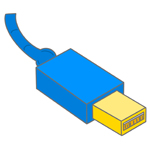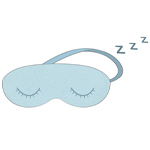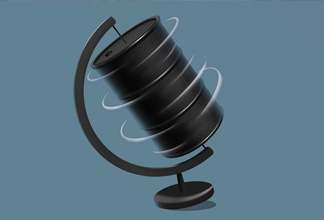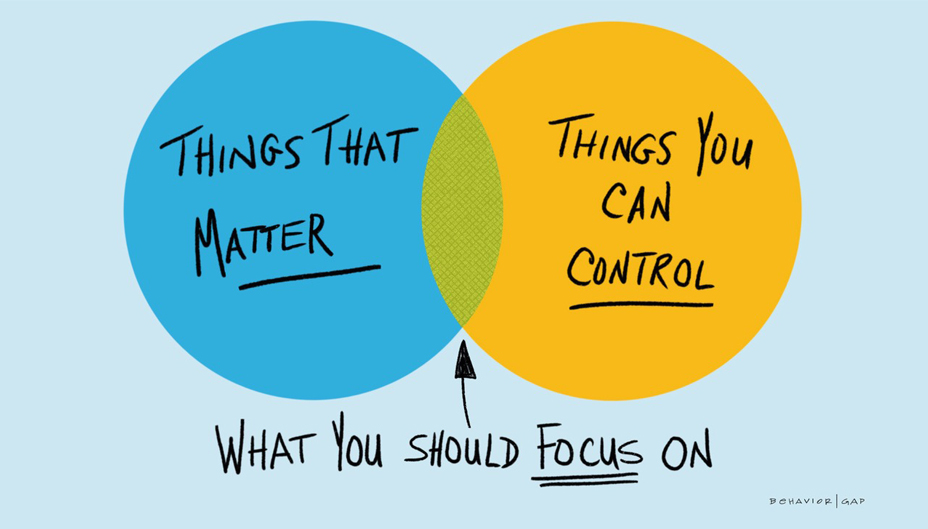How to Focus on What Matters Most
Written by Sarah Treleaven
Published on November 9, 2020
minute read
Share:
Our current reality might have you more than a little on edge. Between the pandemic and uncertain economic conditions, many Canadians now feel like they have adrenalin coursing through their veins 24/7. It's a recipe for fatigue, burnout, anxiety and unfocused decision-making — which is never a good mix for an investor. Here are seven tips to help slow down your racing thoughts and calm your nerves, so you can focus on what really matters to you.
 1. Be a little more "Stoic"
1. Be a little more "Stoic"
Ancient Stoic philosophers believed that life is less about what happens and more about how we respond — and one of their basic principles is that you shouldn't spend too much time worrying about things you can't control. Marcus Aurelius famously said that he could "choose not to be harmed." That might sound a little glib in the context of so much upheaval; so instead spend some time thinking about how you can channel any frustration into actionable goals — in other words, the things that can be changed. Can you help ease a burden for someone in your community? Can you involve yourself in a local campaign that feels like positive change? Or can you simply do something nice for someone else who might be feeling defeated right now?
2. Stop "doomscrolling"
At a time of great uncertainty, you might feel like constantly refreshing your social media feed will help you find whatever answers you're looking for. But this kind of frantic activity — deemed “doomscrolling" — can actually end up elevating anxiety. So relax your thumbs, step away from the screen and only check for updates during occasional, set intervals.
 3. Build better habits
3. Build better habits
What to do with your hands if they're not doing the aforementioned doomscroll? One easy answer: reach for a book. It can be a paper book, an e-book or even an audio book. What's important is that you occupy your mind with what you have pre-determined as worthy subject matter, instead of letting the internet lead your down the rabbit hole of its algorithmic choice. Want to learn more about the French Revolution? The human microbiome? Astronomy — astrology? Investing strategies? Or maybe you're looking for a good laugh or a good cry. There are countless books to feed your interests. As you build this new habit, remember to have patience It can take time.
4. Practice self-care by exercising self-control
"Self-care" has become a ubiquitous term that conjures up images of languid yoga sessions, lying in a bubble bath for hours or melting cheese over every edible thing in the house. Whatever works, right? Well, not exactly. In practicing self-care, don't neglect self-control. Before you decide to bury your anxiety in binge watching the latest reality TV hit, conscientiously prioritize the commitments that actually make your life function more smoothly. That way, you won't compound any anxiety with the guilt or shame of evading responsibilities.
 5. Practice "tend and befriend"
5. Practice "tend and befriend"
When you're overwhelmed and not at your best, there's a clear and understandable temptation to wall yourself off and wallow. But that instinct rarely makes you to feel better. Instead, try to "tend and befriend" by turning to your social contacts for mutual support — the issues of the day likely impact them too. There are plenty of ways to practice this, including taking a walk with a good friend, calling the sibling you haven't spoken to for a while or setting aside time to catch up (like, a real conversation) with your spouse. And hey, if no one is available when you reach out, a little self-talk might do the trick.
6. Seek out even a small slice of nature
At a time when we're regularly encouraged to stay at home, cooped up and fretting over our various devices, now is a good time to take advantage of the healing power of the natural world. Get outside and take in the sights, whether it's a nearby frosted forest or a lone evergreen in the city. If you can, keep your phone out of your hands; you'll feel calmer and breathe easier.
 7. Keep it simple
7. Keep it simple
This is the most obvious advice but it's also the first thing many people forget when they're stressed: Take care of your body. That is, eat three nutritious meals a day, do some form of exercise, drink water and get enough sleep. (Get science-based ideas for investors in How to Sleep, Move and Eat Your Way to Savvier Decisions.) These simple acts won't change the world, but they will ensure that you'll be better equipped for whatever you're dealing with.
RBC Direct Investing Inc. and Royal Bank of Canada are separate corporate entities which are affiliated. RBC Direct Investing Inc. is a wholly owned subsidiary of Royal Bank of Canada and is a Member of the Investment Industry Regulatory Organization of Canada and the Canadian Investor Protection Fund. Royal Bank of Canada and certain of its issuers are related to RBC Direct Investing Inc. RBC Direct Investing Inc. does not provide investment advice or recommendations regarding the purchase or sale of any securities. Investors are responsible for their own investment decisions. RBC Direct Investing is a business name used by RBC Direct Investing Inc. ® / ™ Trademark(s) of Royal Bank of Canada. RBC and Royal Bank are registered trademarks of Royal Bank of Canada. Used under licence. © Royal Bank of Canada 2020. All rights reserved.
The views and opinions expressed in this publication are for your general interest and do not necessarily reflect the views and opinions of RBC Direct Investing. Furthermore, the products, services and securities referred to in this publication are only available in Canada and other jurisdictions where they may be legally offered for sale. If you are not currently resident of Canada, you should not access the information available on the RBC Direct Investing website.
Explore More

The Hidden Costs of Being Single
How single Canadians can build wealth on their own terms
minute read

What Investors Can Learn from Hockey Star and RBC Olympian Sarah Nurse
Nurse's path to the podium reveals how preparation, planning and practice can turn potential into a golden opportunity
minute read

Crude Questions? A Look at Canada’s Oil Economy
What you need to know about Canada’s oil industry
minute read
Inspired Investor brings you personal stories, timely information and expert insights to empower your investment decisions. Visit About Us to find out more.







